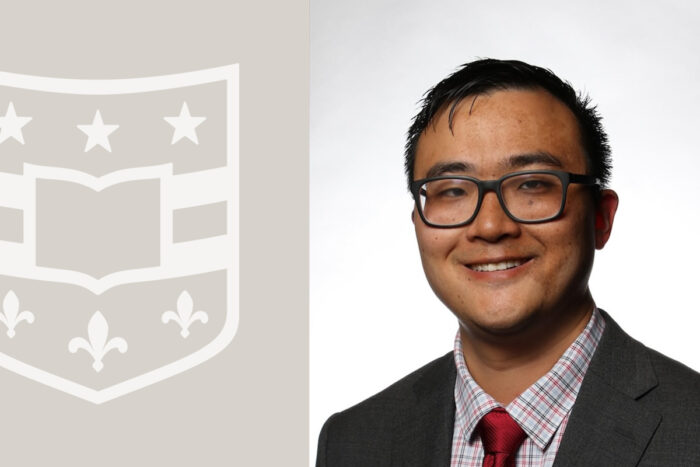Lee named new head of ophthalmology & visual sciences
Nationally recognized vitreoretinal surgeon leads efforts to apply AI to advance vision research, improve patient care
 American Diabetes Association
American Diabetes Association Aaron Y. Lee, MD, a leader in applying artificial intelligence to ophthalmology research and patient care, will head the John F. Hardesty, MD, Department of Ophthalmology & Visual Sciences at WashU Medicine beginning in September.
Aaron Y. Lee, MD, a physician-scientist at the forefront of applying artificial intelligence (AI) to ophthalmology research and patient care, has been named the head of the John F. Hardesty, MD, Department of Ophthalmology & Visual Sciences at Washington University School of Medicine in St. Louis and the Arthur W. Stickle Distinguished Professor in Ophthalmology & Visual Sciences. His appointment begins Sept. 1.
A nationally recognized surgeon, Lee comes to WashU Medicine from the University of Washington, where he is the C. Dan and Irene Hunter Endowed Professor of Ophthalmology. His appointment was announced by David H. Perlmutter, MD, executive vice chancellor for medical affairs, the George and Carol Bauer Dean of WashU Medicine and the Spencer T. and Ann W. Olin Distinguished Professor.
“We are fortunate to recruit this talented new leader, who brings expertise in the rapidly evolving field of AI, to WashU Medicine,” said Perlmutter. “The world-renowned Department of Ophthalmology & Visual Sciences has a long history of leadership in clinical practice and science, and with Dr. Lee’s recruitment, we see enormous potential to advance to even more impact in the coming era.”
Lee is no stranger to WashU. After graduating from Harvard University, he earned his medical degree from WashU Medicine in 2009 and also was one of the first WashU medical students to complete the school’s newly established Master of Science in Clinical Investigation, which prepares investigators for academic careers in clinical research. Lee did his residency training at WashU Medicine and Barnes-Jewish Hospital and then completed two fellowships – a medical retina fellowship at Moorfields Eye Hospital in London, followed by a surgical retina fellowship the University of British Columbia in Vancouver. He joined the University of Washington faculty in 2015 and rose rapidly to become a full professor in 2024.
With computer programming expertise, Lee has made seminal discoveries that have improved imaging techniques for detecting and scoring the severity of retinal diseases. He has led a team of pioneering machine learning scientists to apply deep learning techniques to vision science and created a new field of research in ophthalmic imaging. This work has led to many innovations, including improving AI’s ability to assess the severity of age-related macular degeneration – an eye disease that affects the retina – based on retinal images. His work also has helped develop a novel severity score for macular telangiectasia type 2, a rare retinal disease that causes a gradual loss of vision, and he has created foundational AI models that can be trained for various types of retinal imaging without a lot of additional data. In recent work, he has identified genetic factors influencing the formation of the macula – the central part of the retina – using advanced data-driven methods. All together, these advances have greatly improved imaging techniques used to detect macular degeneration and rare retinal diseases.
Lee also has worked to create an ecosystem that supports all stages of medical AI devices, from dataset curation and model development to regulatory approval and commercialization. He has collaborated with the U.S. Food and Drug Administration to develop policies for regulating machine learning devices, draft report guidelines for AI studies and run the first comprehensive multicenter study of autonomous AI devices for screening of diabetic eye disease.
At the University of Washington, Lee is the director of research at the Karalis Johnson Retina Center, where he leads the integration of patient care with research by bringing resources into the clinic to facilitate imaging and new research ideas. Lee chairs the Digital Imaging and Communications in Medicine working group that establishes standards for ocular imaging across the medical device industry. He also co-chairs the Ryan Initiative for Macular Research Age-Related Macular Degeneration Consortium, a non-profit collaboration uniting life sciences companies, device manufacturers and academic groups to study age-related macular degeneration.
“I am honored to return to WashU Medicine and lead the Department of Ophthalmology,” said Lee. “WashU stands out for its uniquely collaborative environment and its strong foundation in research and education. I look forward to partnering with the department’s talented faculty, staff and students to drive innovation and expand its leadership in clinical care and vision science research.”
Lee is a sought-after mentor among retina fellows, ophthalmology residents and graduate students. He also chairs the Steering Committee on Information Technology of the American Academy of Ophthalmology, which has integrated big data and AI concepts into the core curriculum of ophthalmology residency programs nationwide.
Lee’s wife, Cecilia Lee, MD, also will join WashU Medicine’s Department of Ophthalmology & Visual Sciences. She is a professor in the Department of Ophthalmology at the University of Washington and holds a Klorfine Family Endowed Chair. Her clinical specialty is in medical retina and cataract surgery, and in research funded by the NIH, she leverages large data sets and innovative AI technology applied to ophthalmic imaging to advance the understanding and diagnosis of Alzheimer’s disease. As scientific partners, the Lees lead the NIH Bridge2AI Common Fund Data Generation Project, a four-year, $32 million project aiming to develop a flagship dataset from 4,000 participants for AI research in type 2 diabetes.
Lee will succeed Todd P. Margolis, MD, PhD, who has led the department since 2014. An Alan A. and Edith L. Wolff Distinguished Professor, Margolis will remain on the WashU Medicine faculty and continue to see patients, teach and conduct research on infectious and inflammatory eye disease.






